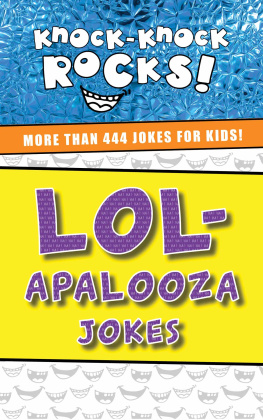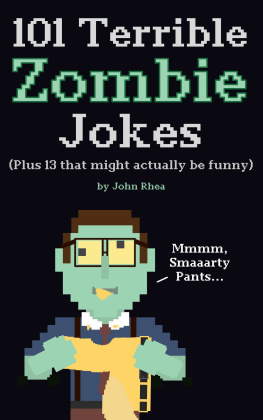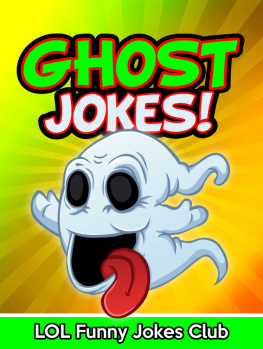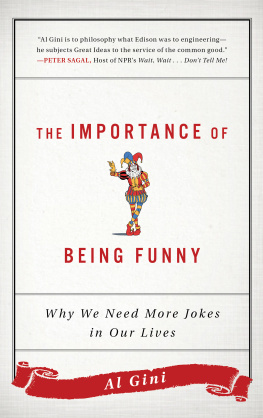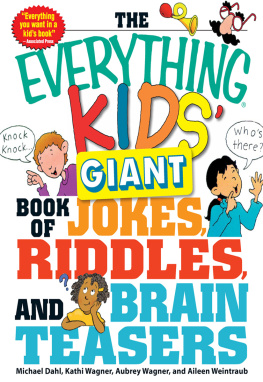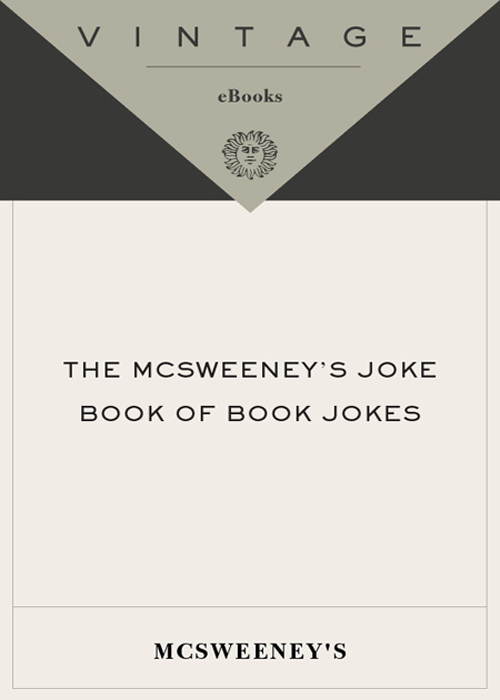
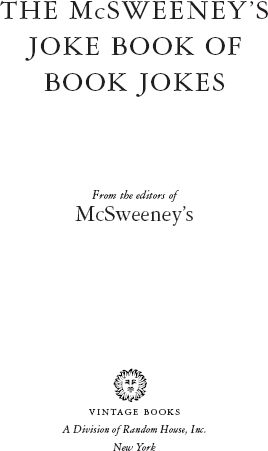
Contents
AN INTRODUCTION TO A BOOK OF BOOKISH HUMOR FROM McSWEENEYS
by John Hodgman
Greetings, readers of books.
My name is John Hodgman.
It is my great pleasure to introduce you to this book of bookish humor from McSweeneys. It is my great pleasure, and also my compulsion, for as you know, I am in their debt.
It was, after all, in the pages of McSweeneys, as well as in the virtual un-pages of mcsweeneys.net, where I finally switched sides, as it were, giving up my gainful employ as a professional literary agent and becoming instead a writer.
And so it was that I first discovered the incredible, untapped commercial potential of the genre that would come to be known as EXTREMELY BOOKISH, VERGING ON TERMINALLY NERDY, LITERARY HUMOR, which would become something of a hallmark of McSweeneys and which, for me, would become, quite literally, a gold mine.
In the year 2000, after just the first appearance of my occasional advice column Ask a Former Literary Agent, I was able to buy three houses for no money down, plus a boat with beautiful women on it.
After my second appearance, I had to sell those things because it turns out I did not make any money on my first appearance. But I was mentioned on a blog (though we didnt call them blogs back then, but websites or bsites).
Yes, there were ups and downs, but now, THERE ARE ONLY UPS. As you may know, I now have a lucrative book writing career cracking wise about the pathetic fallacy and the thirty-six dramatic situations, and I regularly appear on television making jokes about Harold Bloom.
And as you page through this book, you will find the work of similar pioneers in the bookish nerd-humor field, and you will say to yourself: Hey! I have an English degree and/or an MFA in poetry and know a few good Raymond Carver jokes. How did I miss out on this amazing creative moment and FIRST-CLASS PLATINUM MONEY TROUGH? I wish I could hear from someone who got in on the ground floor and could show me how it is done.
Well guess what? I was there, literally. And I am here to help.
One question I am commonly asked at my many seminars is this: What is the secret of literary parody?
And my answer is always the same: SHUT UP, AND GET OUT.
Can you imagine anything more tiring than a book of droll, pitch-perfect emulations of a particular genre or narrative voice? Just writing that sentence made me tired. AND ANGRY.
(Similarly, there will be many people in your life who will attempt to explain to you the difference between parody and satire, and all of them should be shunned, as they are loathsome people.)
Whatever the intent of such emulation, the result is usually not lasting and usually not funny.
By contrast, the pieces gathered within are not send-ups or emulations. Jared Blooms fragment of the very authorized biography of Steven Seagal does not rely on your knowledge of the tropes of celebrity biography in order to be funny; it merely requires that you have some familiarity with ass-kicking. Similarly, Tim Carvells Unpublished Coda to Harper Lees To Kill a Mockingbird asks only that you find the image of Atticus Finch killing a monkey funny. AND ALL HUMANS DO.
Rather, these are all original pieces of humorous writing that are joined together merely by their appreciation of the intrinsic and unique hilariousness of books.
The next question I often get in my seminars is this: Are books themselves an arbitrary subject for humor, or is there something intrinsically and uniquely hilarious about books and book culture?
To which I reply: WHAT DID I JUST TELL YOU? WHAT IS WRONG WITH YOU PEOPLE?
We all know that books are funny. First, they are made of paste and cloth, which is funny, as is the fact that people still buy and read them.
Also, books connote a sort of intellectual stuffiness, which is always easy and appealing to make fun of. Its humanizing. Jean-Paul Sartre was a gloomy genius. When you realize he had a walleye and a clubfoot and a hunched back and a wooden thigh, its consoling and also very funny.
Another example. It is hilarious that Herman Melville wrote Moby-Dick. It is hilarious, too, that he was never recognized for his accomplishment in his lifetimethat it would one day be considered a classic, earning praise and fortunes that Melville would never enjoy, due to his being dead. It is hilarious that it has a tattooed cannibal in it named Queequeg and also a guy with a peg leg, and whats more, its GODDAMNED TITLE IS MOBY-DICK. Priceless. I know, as we all do, that Moby-Dick is hilarious, and I HAVENT EVEN READ IT.
To borrow a term from Yiddish vaudeville, Melville was a loser. And this speaks, I think, to the true secret of why books and authors are funny: because they are sad.
They are sad as zeppelins are sad: they wish to soar, but they are using a technology that is old, largely forgotten, and highly flammable. It is this ambition to relevance that makes books and zeppelins funnier than blimps, which you will agree are merely pathetic, and, since they do not have rigid siding, mushy.
As I mentioned before, some years ago I worked at a literary agency. Short of prowling the aisles of the Strand, there is nothing to remind you more of the sadness of books than working at a literary agency. The agency had once been a nineteenth-century bank, and piled in its various odd corners and down its long halls were books by our clients, most of them long out of print, each one once a dream that had briefly glimmered and then came to rest and molder here, forgotten. I seem to recall that many of them were collections of semischolarly essays on the subject of Star Trek. But that was just chance and the particular taste of this agency.
Regardless of their Star Trek content, most books are personal. Most books take time. Most books want to be remembered and to contribute to the culture, a culture that was beginning to care about books less and less. And all of these books were forgotten.
And these were just the published books. You can imagine how many more came to us for consideration that would never be published, often accompanied by a photograph of the author, smiling, hoping, maybe holding a quill or a dog.
Aspiring authors, let me confirm your deepest fears: yes, we made fun of you. We junior members of the agency would put your photos up on a bulletin board and laugh and laugh.
We would take your manuscripts once a week into the vault and burn them there while dancing. We were not just being cruel: it was a ritual, an exorcism. As you can imagine, publishings lowest ranks are larded with aspiring writers, and we feared your manuscripts and your desperation because we were afraid it would curse us.
And then when the burning was done, we would collapse in a crazed heap and sleep for days. Thinking back, if I were to do it all again, I probably would leave the vault door open a crack. But those were the crazy days, the go-go, set-a-fire-in-an-airtight-vault midnineties. And I was drunk.
Now, it never came to pass that we burned a manuscript of twee bookish humor, because honestly, who would have been crazy enough to write such a thing?
But things began to change. When the Internet began to take hold, suddenly everyone could publish their essays on Star Trek, and they would be in print forever.
And then came McSweeneys. And like a simile-as-yet-to-be-determined-connoting-great-and-sudden-speed-and-power, a generation of young writers found a venue that was not controlled by people like me, who had access to big publishers and airtight vaults, a venue that would not bog their creativity down with slow pub dates, editing, and cash payments.
Next page


